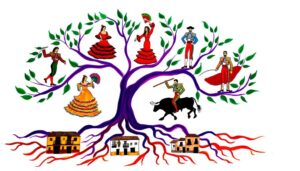Meaning of the Name Irene
The name Irene, derived from the Greek word 'Eirēnē,' means 'peace' and encapsulates values of harmony and tranquility. Historically, it has been borne by notable figures such as Empress Irene of Athens, who played a key role in the Eastern Orthodox Church, and early Christian martyrs like Saint Irene of Thessalonica.
In Greek mythology, Irene personifies peace and societal harmony, reinforcing its cultural significance. The name has maintained global popularity, especially in Europe, due to its elegant and positive connotations.
To understand its full impact across history and cultures, further exploration reveals intricate details.

Key Takeaways
- Irene means 'peace' and originates from the Greek word 'Eirēnē.'
- In Greek mythology, Irene is the goddess of peace, symbolizing harmony and tranquility.
- Early Christian saints named Irene exemplify virtues like fortitude and unwavering faith.
- The name Irene has been adopted into various languages, maintaining its appeal and positive connotations.
- Famous namesakes include Empress Irene of Athens and Nobel laureate Irene Joliot-Curie.
Etymology and Origins
The name Irene originates from the Greek word 'Eirēnē,' which translates to 'peace' in English. This etymology underscores a linguistic and cultural connection to ancient Greece, a civilization renowned for its contributions to language, philosophy, and governance.
The term 'Eirēnē' itself was used in classical texts to denote harmony and tranquility, reflecting societal values of the time. The adoption of this name into other languages and cultures over centuries highlights its enduring appeal and the universality of its meaning.
Understanding its Greek roots provides insight into its historical context and semantic evolution. Therefore, the name Irene not only reflects a desirable state of peace but also serves as a linguistic artifact from ancient Greek civilization.
Historical Significance
Throughout history, Irene has been a name borne by influential figures, especially empresses and saints, underscoring its significant cultural and historical impact.
Significantly, Empress Irene of Athens ruled the Byzantine Empire during the 8th century and was instrumental in restoring the veneration of icons, a pivotal event in the history of the Eastern Orthodox Church.
Additionally, Saint Irene of Thessalonica, a revered Christian martyr, is celebrated for her steadfast faith and endurance under persecution. These historical figures highlight the name's association with leadership, piety, and resilience.
The enduring legacy of these women has guaranteed that the name Irene remains synonymous with strength and historical importance, influencing subsequent generations and retaining its relevance across centuries.
Irene in Mythology
In Greek mythology, Irene is venerated as the goddess of peace, embodying ideals of harmony and tranquility. Her symbolism and iconography, often depicted with olive branches and cornucopias, represent prosperity and mutual accord.
This mythological figure has substantially influenced cultural narratives and artistic expressions, reinforcing the name's association with peace throughout history.
Greek Goddess of Peace
Ancient Greek mythology venerates Irene, or Eirene, as the personification of peace and prosperity, embodying the harmonious and tranquil aspects of society. Irene is one of the Horae, daughters of Zeus and Themis, who collectively represent natural order and justice. Her role extends beyond mere allegory; she was invoked in times of peace and celebrated in Athenian festivals, reflecting her integral place in civic life.
Irene's influence is rooted in a historical context where peace was a cherished ideal, essential for societal progress and economic stability. As a deity, she symbolizes the cessation of conflict and the flourishing of communal well-being, highlighting the ancients' deep appreciation for the virtues of peaceful coexistence.
Symbolism and Iconography
Depictions of Irene in ancient Greek art and literature consistently emphasize her role as a serene and benevolent figure, often shown holding symbols such as the olive branch and cornucopia to represent peace and abundance.
As one of the Horae, the goddesses of the seasons and natural order, Irene's iconography underscores her association with prosperity and societal harmony. Statues and reliefs frequently portray her in flowing garments, embodying both grace and tranquility.
The olive branch, a universal emblem of peace, and the cornucopia, symbolizing bountiful harvests, highlight her integral role in ensuring the well-being of the community. These visual and literary representations collectively reinforce Irene's enduring image as a guardian of peace and prosperity in classical mythology.
Influence on Culture
The profound symbolism and portrayal of Irene in classical art and literature have greatly shaped her influence on various aspects of ancient and modern culture.
In Greek mythology, Irene, the personification of peace, was one of the Horae, goddesses of the natural order. Her depiction in classical sculptures and mosaics often symbolized societal harmony and prosperity. This iconography permeated Renaissance art, where Irene was invoked to reflect the ideals of civic peace.
In literature, her name signifies tranquility and order, influencing character development and thematic elements. Modern cultural references, from literature to visual arts, continue to draw on this rich heritage, demonstrating Irene's lasting impact on the conceptualization of peace and harmony in human societies.
Saints Named Irene
In examining the historical importance of saints named Irene, it is essential to explore the narratives of early Christian martyrs who bore this name.
These saints, often venerated for their unwavering faith, have become emblematic figures with distinct attributes.
Understanding their roles as patron saints allows for a thorough analysis of their lasting influence within Christian history.
Early Christian Martyrs
Among the early Christian martyrs, several saints named Irene stand out for their unwavering faith and profound impact on the Christian community. Saint Irene of Thessalonica, martyred in the 4th century, is remembered for her steadfast devotion despite severe persecution under Emperor Diocletian.
Another notable figure is Saint Irene of Rome, who was martyred alongside her husband, Saint Castulus, for sheltering persecuted Christians. These early martyrs named Irene exemplify the courage and resilience that were crucial during the nascent stages of Christianity.
Their sacrifices contributed significantly to the spiritual and communal fortitude of early Christian society, providing a foundation of faith that would inspire generations to come. Their stories underscore the historical importance of martyrdom in shaping Christian heritage.
Patron Saints' Attributes
Embodying virtues such as fortitude, compassion, and unwavering faith, saints named Irene are venerated for their exemplary attributes, which have inspired countless believers throughout history.
Saint Irene of Thessalonica, for instance, is celebrated for her steadfastness in the face of persecution, embodying remarkable courage.
Another notable figure is Saint Irene of Rome, renowned for her benevolence and dedication to aiding martyrs.
Their lives collectively illustrate a profound commitment to Christian principles and humanitarian efforts.
These saints have been commemorated in various hagiographies, underscoring their roles as paragons of divine virtues and moral integrity.
Their legacies continue to serve as moral compasses, guiding the faithful in the pursuit of piety and altruism.
Historical Significance Explained
The historical significance of saints named Irene is deeply rooted in their enduring influence on Christian hagiography and their roles in shaping the religious and cultural landscape of their times.
Saint Irene of Thessalonica, martyred in the 4th century, is celebrated for her unwavering faith during the Diocletian Persecution. Her martyrdom exemplified the strength and resilience of early Christians.
Another notable figure, Saint Irene of Hungary, played a pivotal role in the Christianization of Hungary in the 11th century, promoting religious education and charitable works.
These saints, through their piety and contributions, have left an indelible mark on Christian history, serving as paragons of virtue and catalysts for religious and societal transformation in their respective eras.
Irene in Literature
Renowned for its classical origins, the name Irene has been prominently featured in various literary works throughout history. Especially, it appears in Greek mythology, where Irene, or Eirene, personifies peace.
This mythological presence inspired later literary references, such as in Aristophanes' play 'Peace,' symbolizing harmony and tranquility.
In the 19th century, Irene became a favored name in European literature, most particularly in Henrik Ibsen's play 'When We Dead Awaken,' where the character Irene embodies themes of memory and awakening.
Additionally, the name surfaces in modern literature, such as in the works of Agatha Christie, where Irene Adler in 'A Scandal in Bohemia' exemplifies intelligence and intrigue. These varied representations underline the name's enduring literary significance.
Cultural Variations
Reflecting a rich tapestry of historical and cultural influences, the name Irene manifests in various forms and significance across different societies. In ancient Greece, Irene, derived from Eirene, symbolizes peace and was worshipped as a goddess. In the Roman Catholic tradition, Saint Irene is venerated as a martyr, illustrating the name's spiritual resonance. In modern Spain, the name is often spelled "Irena", while in Eastern Europe, variants such as "Irina" are prevalent, showcasing the adaptability and enduring appeal of the name across diverse regions.
| Region | Variant | Cultural Significance |
|---|---|---|
| Ancient Greece | Eirene | Goddess of Peace |
| Roman Catholic | Saint Irene | Venerated as a martyr |
| Spain | Irena | Popular modern adaptation |
| Eastern Europe | Irina | Commonly used, reflecting Slavic heritage |
| Scandinavia | Irene | Maintains traditional form, popular usage |
These variations underscore the name's universal appeal.
Modern Popularity
In contemporary times, the name Irene continues to enjoy widespread popularity, reflecting its deep historical roots and cultural significance.
Derived from the Greek word 'eirēnē,' meaning peace, Irene has been a favored choice across various cultures and decades. Statistical data shows consistent use in Europe, particularly in countries like Spain, Italy, and Greece, while maintaining a steady presence in North America.
Sociologically, the name's appeal can be attributed to its phonetic simplicity and positive connotations. Modern parents often select Irene for its timeless elegance and the sense of tranquility it embodies.
Despite fluctuations in naming trends, Irene's enduring resonance underscores its relevance in today's multicultural world, bridging historical tradition with contemporary naming practices.
Famous Namesakes
Throughout history, the name Irene has been borne by numerous notable figures, contributing to its lasting legacy and cultural significance.
Among them is Empress Irene of Athens, who ruled the Byzantine Empire from 797 to 802 AD and was instrumental in restoring the veneration of icons.
Another prominent namesake is Irene Joliot-Curie, a Nobel Prize-winning chemist, recognized for her work in radioactivity.
In the arts, Irene Papas, a renowned Greek actress, has left an indelible mark on both stage and cinema.
The name also finds resonance in modern times with figures like Irene Khan, a prominent human rights advocate and former Secretary-General of Amnesty International.
Each of these individuals exemplifies the enduring impact of the name Irene across various domains.
Conclusion
The name Irene, derived from the Greek word for peace, has a rich historical and cultural legacy.
It is notable that in 2021, Irene ranked 609th among baby names in the United States, reflecting its enduring appeal.
From its mythological roots to its presence in literature and religious history, Irene has been a symbol of tranquility and virtue across various cultures.
This multifaceted significance underscores its lasting resonance through time.






